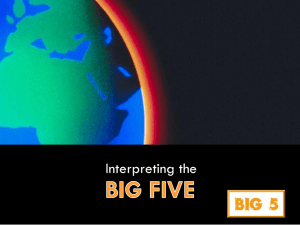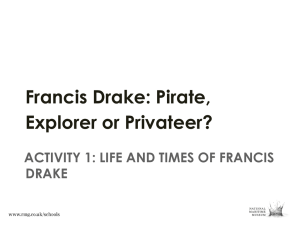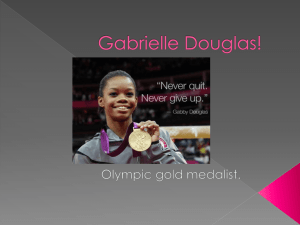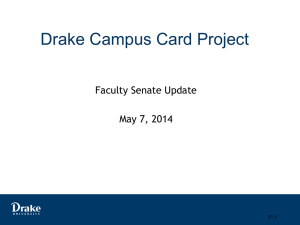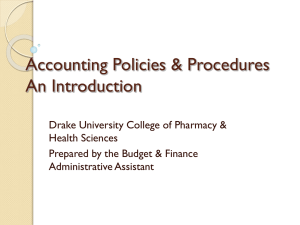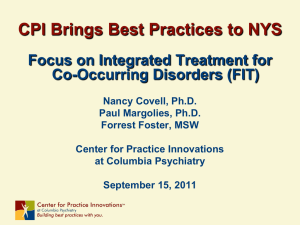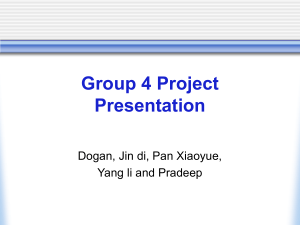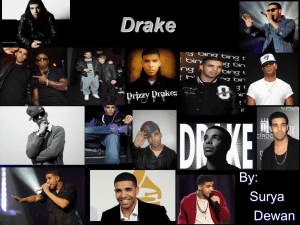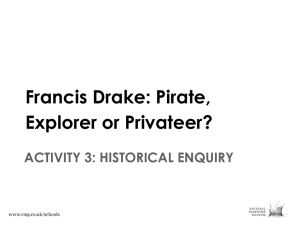The Case of the Gasping Garbage
advertisement
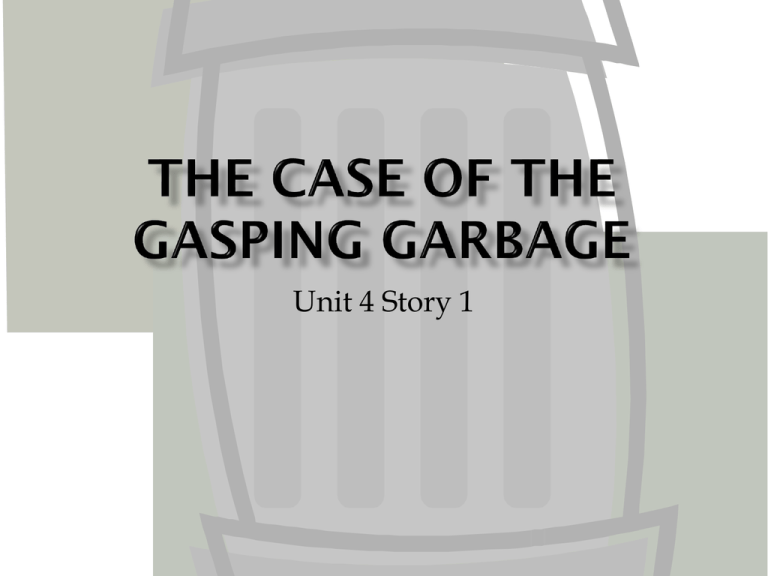
Unit 4 Story 1 Day One Why can’t you always believe what you think you see? Concept Talk Video Page 20j P. 20-21 Why can’t you believe it when you see a pool of water in the desert? Why is the image of the pencils in the water deceiving? What illusion does the fountain create? As you listen to the read aloud(p 21b), choose ONE of the following words to listen for and find the meaning of. Invisible Pretending Fooled Judged Read aloud for GT Invisible In “The Emperor’s New Clothes” the emperor pretends to see his invisible clothes. Does the author include any context clues that tell me the meaning of the word? Give an example of something invisible. Where are the syllables in Invisible Pretending If you are pretending, you are making believe. The boys were pretending to be firemen. Pretending game: Pretend to be something and the class will guess what you are pretending. What is the base word in pretending? What is the suffix? Fooled: Fooled means “to be tricked.” He was fooled into believing that it was Saturday. Teach/Okay: Tell a partner about a time you were fooled. What is the base word and suffix in fooled? Judge: To form an opinion of something or someone is to judge. Teachers judge students on their behavior and work habits. Quick Write: Explain the quote, “Don’t judge a book by its cover” What makes the /j/ sounds in judge? I can compare and contrast characters in the text. Compare and Contrast video When you compare and contrast, you tell how TWO or MORE things are alike and different. You can compare and contrast TWO or MORE things you read about or compare something you read with something you already know. Alike Two things in text One thing in the text with something I already know Different “See pictures in your head as you read.” Helps readers form mental pictures of what they are reading to help them comprehend. Try to picture in your mind what the author has written. This helps the story to come to life! “Watching a movie in your mind!” Read Detective Techniques on page 23. Discuss callouts to demonstrate skills and strategies. Complete p. 247 in workbook with a partner. Be ready to share answers with the class. Insert copy of workbook page 247 Having an empty space inside Why can’t you always believe what you think you see? Using at least one amazing word or vocabulary word, write a sentence with at least 12 words. Day Two Why can’t you always believe what you think you see? She’s always exploring the crime scene- going into spooky old houses and deserted castles searching for a clue. What does spooky mean? What does deserted mean? ‘She’s always exploring the crime scene’ is a generalization. What proof does the author give for this generalization? Based on this sentence, why would someone explore a crime scene? deceiving Cause someone to believe something that is not true Look at book page 20-21. Why is the photograph of water in the desert deceiving. Whom were the weavers deceiving and for what reason? When was a time you were deceiving? What is the base word and suffix? How many syllables? unthinkable Word Parts: Take apart the word unthinkable. What is the base word? The suffix? The prefix? What do you think this word means? Introduce: If something is unthinkable, it is hard to imagine it. Demonstrate: It was unthinkable that they should run out of water. Apply: List other things that are unthinkable. Suffixes: -ian, -ist, -ism Remember the word biologist? What did it mean? -ist means “one who.” A biologist is “one who studies life.” An idiom is a colorful expression or phrase that cannot be understood from the ordinary meaning of the words. You have to look at ALL the words as a whole. Jargon is a special language of a particular profession or group. Read page 23. In paragraph 5, there is the idiom, “jumps right in.” What does this phrase mean? Now look at paragraph 4 and find an example of jargon. Do you know some football jargon? I can compare and contrast characters’ actions and thoughts in a story. video Realistic Fiction: tells stories about people and events that are not real, but COULD be. Use what you already know about people and the world to understand realistic fiction. Preview and Predict: Take a picture walk: look at titles, subtitles, and illustrations. Make a prediction about what this story may be about. Remember: When you come to words you don’t know, use the words around it to solve the meaning. Look for synonyms or antonyms to help solve word meaning. Adjust your reading rate in order to understand what you are reading. You may need to slow down in spots to make sure you care comprehending the text. Read pages 28- 35. Discuss the guided reading questions. When you finish reading, write a retelling independently. Share your retelling with your table. Pg. 30 and 31: Contrast how Drake feels about Gabby’s phone call with how he reacts. Pg. 31 How are Frisco’s views about following rules different from Drake’s views? Pg 30 and 31: How are the adventures the Science Detectives and the Mad Scientist alike and different? In your Bobcat Journal….. What did you learn about being a scientific detective? How would you compare and contrast Drake and Frisco as scientists? Using a Venn Diagram, compare detectives Drake and Frisco. Day Three Why can’t you always believe what you think you see? With her coffee-covered hair pulled back in a no-nonsense ponytail, her scientist cap shoved atop her head, and her mouth set in a firm line, she looked ready to take on this most difficult case. Identify THREE descriptions of Nell. How do these descriptions show that Nell is ready for a difficult case? astonished Yesterday we learned that Drake was astonished when Gabby asked him to investigate the monster in her garbage can. Astonished means to be surprised and amazed. What astonished Drake about his competitor, James Frisco, the Mad Scientist? What has astonished you recently? What hunks/chunks do you see in this amazing word? illusion Phonics Dance: Which hunks and chunks do you see in this word? An illusion appears to be different from what it really is. The boys gave the illusion of not being afraid. Most magic tricks rely on illusion. Do you remember what THESE amazing words mean? Invisible Judge Deceiving unthinkable Synonyms: a word that means almost the same as another word. Dazzle and amaze Shimmering and gleaming Can you name other synonyms? Antonyms: a word that means the opposite of another word. Shiny and dull Fancy and plain Hot and cold Can you name other antonyms? Write precise, or detailed, instructions explaining how to take care of your pet tarantula. If I am unsure of the meaning of precise, I know that authors use a clue word ‘or’ to introduce a synonym for an unfamiliar word. Do you see a synonym for the word precise in the above sentence? Let’s try that word in our sentence and see if it makes sense. If you are relentless, or persistent, you might consider a career as a detective. Using context clues, what do you think the word relentless means? Try using the synonym you found in place of the word relentless. Read page 25. Use context clues to find the meaning of the highlighted words. I can compare and contrast characters’ actions and thoughts in a story. What do you remember? Why would people rather have the Science Detectives work on their cases instead of the Mad Scientist? As you read details about the Mad Scientist, what do you imagine his laboratory looks like? Retell what you read yesterday. Finish reading pages 36-41. Discuss guided reading questions with your partner Summarize what happened in the story today. Tell all details you can remember. Discussion questions on page 42, if time. Pg. 38 What can you learn about Nell from her conversation with her mother? Pg. 40 and 41 Compare the purpose of the list of clues and the purpose of the set of experiments. End of Story: Why do you think Drake and Nell are successful as a team of science detectives? Why? Bobcat Journal: Discuss how Drake and Nell solved the mystery of the gasping garbage can. How would you compare and contrast Drake and Nell to other detectives you have read about? How are Drake and Gabby different? A. Gabby likes facts. B. Gabby is a vegetarian. C. Gabby dislikes meeting with Drake. D. Gabby was a top notch scientist. Day Four Why can’t you always believe what you think you see? Suddenly, the garbage can gasped. It trembled. It burped and yurped. It belched and yelched. What words does the author use to describe what the garbage can is doing? Which two words are synonyms? How are the meanings of these words related to the meaning of the word gasped? Which words are made up? Why did the author make up these words? disappeared Do you see a hunk or chunk? A prefix or suffix? We learned that the scientists’ fears disappeared when they discovered the true cause of the noises coming from inside the garbage can. Disappeared means vanished or departed How did Gabby feel when the ‘monster’ noises disappeared from her garbage can? How did you feel when your fear of something disappeared? spectators What hunks/chunks do you see? If you are a spectator, you are watching an event. The spectators watched the swimmers compete. Name an event you would like to be a spectator at. How many syllables are in the word spectators? I can compare and contrast characters’ actions and thoughts in a story. Procedural Text: Recipe Give us the sequence of activities needed to carry out a process or procedure. What recipes have you helped to make? What did it include? Recipes are found in cookbooks, videos, newspapers, magazines, and online. The list ingredients and step by step directions to make something. A picture of final dish sometimes included. Read the text on pages 46-49. What text features do you see? Why is it necessary to follow the steps in order? How would providing photographs of step by step instructions help someone successfully make a dish? Reread page 47. In this recipe, there are two mixtures . How are the mixtures different? What did you learn about reading a recipe? How would you judge Mr. Talberg’s famous bread recipe? Why is it important to write a recipe as procedural text? Day Five Complete your MC weekly test. As soon as your MC is finished, put answers in the computer. When you have finished ALL of this, you may choose a center you have not been to this week and complete it. If you need to revise your ER from yesterday, your teacher will let you know Have you read a good book that you want to tell us about? Was there a great part of a book you read you would like to share? Have you written something that you would like to share with the class? If you do, get it out and let’s talk!

